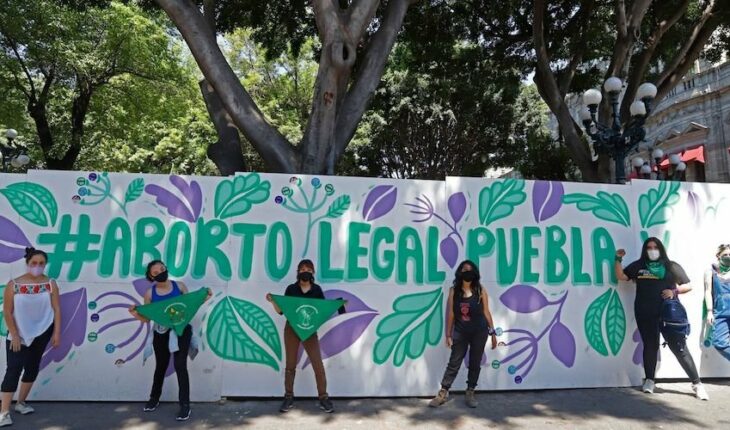On August 7, 2019, a few days after taking protest as governor of Puebla, Luis Miguel Barbosa Huerta said that he would have signed a pardon for women imprisoned for abortion to obtain their freedom; however, the Ministry of the Interior confirmed that no woman deprived of her liberty for abortion or homicide by reason of kinship has been pre-released.
The president himself indicated, at a press conference in April 2020, that there were five women arrested for “that criminal figure that is called homicide by reason of kinship […] when they are held responsible for losing the product of a pregnancy after three months.” According to data from the Superior Court of Justice (TSJ), there would be seven women sentenced and, according to the Secretariat of State Security, 18 women deprived of their liberty for that crime.
For Verónica Cruz Sánchez, of Centro Las Libres, Puebla is an example of how amnesty remained in the discourse, because in reality it is unattainable and inaccessible for women sentenced for abortion and related crimes.
Read more | The green tide reaches Sinaloa: Congress approves decriminalization of abortion
No women benefited
In response to the requests, the Court responded that from January 2007 to November 2021 there would be seven women sentenced for homicide by reason of kinship. Of these, two judicial processes were based in the judicial district of Zacatlán, another two in Tepeaca, one more Tepexi de Rodríguez, another in Huauchinango and one more in Puebla.
For its part, the State Public Security Secretariat, in charge of penitentiary centers, reported that there are 18 women deprived of their liberty for the crime of homicide by reason of kinship. This could mean that 11 women accused of this crime are deprived of their liberty without a sentence.
Despite this, the State Ministry of the Interior reported that there are zero records of women who, due to the crime of abortion or homicide by reason of kinship, were granted a pardon in accordance with the Decree of the Executive of the State of Puebla.
Verónica Cruz Sánchez, of Centro Las Libres, said in an interview that “Puebla is an example that since it is not working (the amnesty), that is, it was a more discursive law to respond to the voices that we were saying that it is brutal that the State has in jail women criminalized for abortion and related crimes.”
He added that in 2010, after finding in Guanajuato several women deprived of their liberty for spontaneous abortions, premature births or obstetric emergencies, Centro Las Libres expanded its analysis to other states and by that year there were 25 women in Social Readaptation Centers in Puebla in the same circumstances. Although from 2010 to 2015 the cases of 10 of these women were reviewed and released, at least 15 others would remain hospitalized.
“Neither those five that he (the governor) at least already had detected, nor those five could benefit from the law, imagine the rest of the women who have not found them, who have not looked for them and worse, that they do not know that they did not commit a crime,” said the activist.
According to the Amnesty Observatory, in its report “Amnesty Law: a year of simulation” of 2021, it points out that at the federal level only one case of abortion and homicide based on kinship has been known that has requested the amnesty process, but Verónica de la Cruz maintains that even in that case no progress has been made.
Pardon Council, inoperative
In August 2019, Governor Luis Miguel Barbosa said he signed a decree that would initiate legal procedures for the pre-release or pardon of those who are imprisoned for abortion, according to the press release 120819.
Months later, in April 2020, the president was questioned about the process of pre-release of women deprived of their liberty for abortion, to which he replied: “What we have to do – we are going to do it tomorrow – is to integrate […] a previous advice to already determine the pre-releases. Then tomorrow it is integrated at 12 o’clock in the day, once integrated we begin to determine the pre-releases”.
On April 21, 2020, the Consultative Council of the Pardon in Puebla was installed, which would analyze the possible pre-releases of 309 indigenous people not speaking Spanish who were sentenced, also five cases of women arrested for the crime of homicide by reason of kinship and 84 people with mental illnesses or disabilities.
The pardon council would be composed of the heads of the Ministry of the Interior, the Secretariat of Public Security, the Secretariat of Substantive Equality and the Council.Legal Sejería; a representative of the Office of the Prosecutor; a representative of the Legislative Power, a representative of the Judiciary, three representatives of the social sector, and a Technical Secretariat.
As part of the social representation, María Elena Bravo Hernández, member of the civil society advisory group of UN Women; the rector of the Universidad Iberoamericana, Ernesto Patrón Sánchez, and Gerardo Tejeda Foncerrada, president of the Escuela Libre de Derecho.
According to the response to the request for information, since its installation in April 2020 and until the end of 2021, the pardon council met on only one occasion and it was precisely to formalize its installation. This means that until that date no case had been analyzed for abortion, homicide by reason of kinship or any other crime contemplated in the regulations.
From the perspective of Amaranta Valgañón, strategic litigation lawyer at Equis Justicia para Mujeres, the federal law, approved in April 2020, was intended to be a model for it to be replicated in the entities; however, depending on how it has been designed in each state is the degree of progress or success it has had.
For example, in the State of Mexico, a law was created that was operated by the Judiciary and that flowed much faster than the Federal one, Valgañón said during a telephone interview. This is because it did not imply the creation of a commission, as if it happens in the Federal and Puebla cases, and because public officials who do not have experience in evaluating evidence make a first analysis and then send the cases to the Judiciary.
The lawyer also mentioned that there is a whole issue with the political will to make that law a reality, since the sessions that were held at the Federal level analyzed very few cases, of more than a thousand requests had only resolved 38 until last year. In the case of Puebla, there have been no sessions to analyze cases.
The Social Communication liaison of the State Ministry of the Interior was sought to know how the amnesty decree was operating, the answer was that the issue should be consulted with the Governor’s Legal Counsel. The coordinator of Social Communication, Verónica Vélez Macuil, was then sought, who at the time of writing had not responded to the request for an interview.
The reform fell short
Another issue that is missing, according to Amaranta Valgañón, is transparency. “They don’t have any mechanism to report how many cases they are receiving, how many cases they are resolving, how many in the affirmative and how many in the negative sense. […] All this means that the chamba, if it exists at all, cannot be seen.”
Likewise, unlike the federal Amnesty Law, published in April 2020, the Regulations for the Optional Exercise of the Faculty of Pardon in Puebla indicate that for people to access the benefit they must not have a history of family violence, nor have disciplinary reports, be “exemplary” for their conduct in prison and dedication to work and participate in cultural activities, educational, job training and health protection.
These requirements are very similar to those contained in article 141 of the National Law on Criminal Enforcement, referring to early release, and which, according to Amaranta Valgañón, were one of the mistakes in the options existing before the amnesty.
On the issue of abortion, explained the lawyer of Equis Justice for Women, since the law is designed it is a political flag to be replicated in the states. However, it is clear that abortion assumptions at the federal level were going to be very few and therefore there would be few beneficiaries of the federal Amnesty Act.
For its part, the study “Progress in the process of implementation of the Amnesty Law one year after its entry into force”, by the Belisario Domínguez Institute, mentions that in addition to the applicability of the Amnesty Law, other actions are required to guarantee non-repetition. “For example, the case of abortion, […] so far there is little progress in the decriminalization of abortion to be eliminated as a crime from the state Criminal Codes. That is, local amnesty laws or initiatives are not being harmonized with other legislative transformations necessary to ensure that women are not imprisoned again, in this case, for exercising their sexual and reproductive rights,” she says.
The decriminalization of abortion in Puebla, as the Belisario Domínguez Institute says, remains the great pending. The previous legislature froze an initiative worked from the feminist collectives with the then deputies Estefanía Rodríguez Sandoval and Rocío García Olmedo, currently the deputy Mónica Silva Ruiz announced that she would present in the month ofand may initiatives to reform the Penal Code, the State Health Law and the Constitution of Puebla to decriminalize abortion and guarantee voluntary interruption of pregnancy services.
What we do at Animal Político requires professional journalists, teamwork, dialogue with readers and something very important: independence. You can help us keep going. Be part of the team.
Subscribe to Animal Político, receive benefits and support free journalism.#YoSoyAnimal





